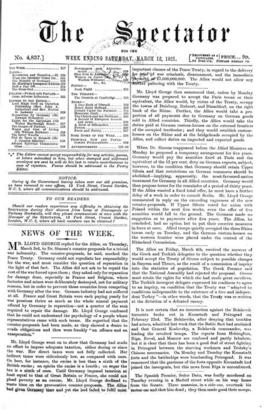When Dr. Simons reappeared before the Allied Ministers on Monday
he proposed a temporary arrangement for five years. Germany would pay the annuities fixed at Paris and the equivalent of the 12 per cent. duty on German exports, subject, however, to the condition that Germany should retain Upper Silesia and that restrictions on German commerce should be abolished—implying, apparently, the most-favoured-nation treatment for Germany in all Allied countries. Germany would then propose terms for the remainder of a period of thirty years. If the Allies wanted a fixed total offer, he must have a further delay of a week in order to consult Berlin. Mr. Lloyd George commented in reply on the exceeding vagueness of tho new counter-proposals. If Upper Silesia voted for union with Poland within the next five weeps, even the offer of five annuities would fall to the ground. The Germans made no suggestion as to payments after five years. The Allies, he concluded, had no option but to put their coercive measures in force at once. Allied troops quietly occupied the three Rhino towns early on Tuesday, and the German custom-houses on the western frontier were placed under the control of the Rhineland Commission.


































